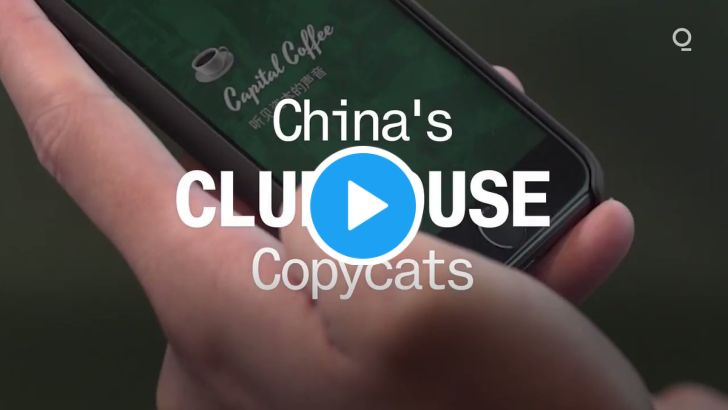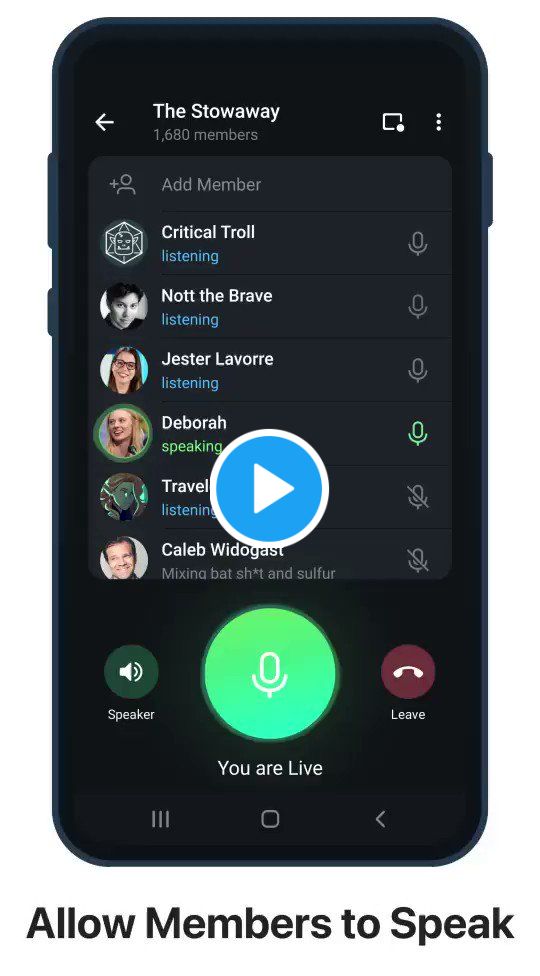The Social Media Report #20
Telegram, Tencent and *checks notes* Capital Coffee move in on audio social
In this week’s edition we take a look at the break-outs in audio social, and the impending anti-competition investigation that seeks to protect social media innovation. We also have as usual my must-read articles of the week.
Subscribe below if you’ve been sent this, and you’ll get every edition soon as it’s out.
Audio-only social media broke out this week, with a range of tech brands big and small rolling out new services in the wake of the Clubhouse craze. Tencent (which owns WeChat, and is China’s version of Facebook), Alibaba (China’s version of Amazon) and Xiaomi (China’s version of Apple) are all testing audio-only chats, according to reports by Bloomberg from China. Less prolific tech brands are also getting in on the audio boom, including 36kr, which has launched Capital Coffee, which resembles Clubhouse in its functionality almost completely.
But it’s not only in China where Clubhouse clones are taking off. Messaging app Telegram also rolling out audio chats. The Voice Chats feature is relatively new inside Telegram, launched first just three months ago, and this week the messaging app rolled out Voice Chats 2.0, which has features such as voice chats being in groups, link sharing for chats and raising your hand to speak. In other words, it’s also doing a Clubhouse.
Telegram has 500 million users, compared to Twitter’s 350 million. There has been much said about Twitter’s emergent audio social network, Spaces, which I’ve had the privilege of being given early access to, but which has felt pretty empty compared to Clubhouse which is bristling with buzz. It’s places like Telegram, and of course China’s upstarts, that pose a greater threat to Clubhouse’s first mover advantage, than Twitter Spaces.
Clubhouse is the app still making all the headlines and attracting the high profile buzz. Just this week, for example I was able to tune into a limited access live chat with Mark Zuckerberg and Daniel Ek, I hosted two events myself, and noticed some milestones made by the high profile hosts on Clubhouse, such as Abraxas Higgins’ 9am In London club reach 20,000 followers (Abraxas for me is the poster child for audio social media in the UK).
You can copy features, but you can’t clone buzz. And that’s what still stands to Clubhouse’s advantage. This is not *all* good news for Clubhouse, though. The imitation game will continue, and while Clubhouse broke through, critical mass could win out.
Many questions, and opportunities, still remain. A people flock to the function of audio social, there is ground to be made by brands, figureheads and upstarts in carving out an audience. Safety is still an issue, too, something inherent in any live, online discourse, and evident in Clubhouse and elsewhere too. And how will regulators and lawmakers keep up? Larger tech brands will use their muscle to keep startups out of their patch, and that kind of behaviour is being watched closely by the authorities.
In the UK this week we saw reports that the CMA, the government department responsible for preventing anti-competitive activities in business, reportedly preparing an antitrust investigation into Facebook “within the next few months”, to do with the social network’s use of data to keep ahead of competitors. I hope for Clubhouse’s sake that it has protected its IP in some way, because it could be really only a matter of time before audio social becomes ubiquitous, and Clubhouse gets lost in the noise.
My must reads from this week
Here are the stories that I have been reading this week.
Virtual worlds
Opensea gets A16z Crypto investment of $23m: my main article in last week’s edition of The Social Media Report was on NFTs, including platforms Rarible, Opensea and Decentraland. Opensea this week announced Andreesen Horowitz, the backer of Clubhouse, as its latest investor, and that the NFT marketplace saw activity rise tenfold from $8m to $95m in sales from January to February this year.
Facebook previews mind controlled bracelet: with the Facebook Reality Labs Andrew Bosworth stating clearly that this device cannot read your mind, one wonders exactly what’s next in VR and AR.
What working from home looks like across the world: a wonderful look by Rest of World after a year of the pandemic.
Work
“Zoom got stuck, freezing beloved or not-so-beloved faces into a rictus of electro-smear.” A hilarious and bang-on analysis of Zoom fatigue by James Parker at The Atlantic.
WeWork the movie: “the new FYRE FESTIVAL! Except about WeWork…” says Mike Butcher. I’ve watched this trailer twice.
Threadit launched in public Beta: Google’s Area 120 incubator has made and launched this mix of virtual meeting and recorded message.
China close to suspending LinkedIn: says it found objectionable content on there, and has already begun censoring.
Publishing
Facebook’s foray into newsletter publishing: Casey Newton delves into the social network’s plans in micro publishing.
Facebook makes long-term deal to pay for news in Australia: the multiyear deal with News Corp Australia will allow Facebook users read and share stories through the social network.
Health
Global ‘proof of Covid jab’ app worked on by tech giants: Microsoft, Salesforce and healthcare providers are working on a tamper-proof app.
Facebook offers WhatsApp tools to help people get vaccinated: this started rolling out last week in the US.
Commerce
£6 in every £10 used to be “driven by” shops. Now it’s £3. Such is the impact of Covid, according to information briefed into the Financial Times.
Olo floats at $450 valuation: food ordering software for restaurants that are adjusting from eat-in to take-away.
Safety
What happens when you DM scammers on the Blue Tick black market: Peter Slattery from One Zero tried it. When you have a blue tick verified account, you get hackers after you, who then sell it on the black market.
How non-English language Wikipedia has a misinformation problem: especially for example Japanese Wikipedia, which is the second most viewed after English.
Facebook’s ‘Red Team X’: Wired profiles the social network’s internal hacking team which tests external tech for holes.
Fascinating review of Yubo by Protocol, the social network for teens to meet strangers: originally built as a way for people to find friends on Snapchat, it is now used as a backchannel for gaming, and changes up the usual way of social networking (no ads, no likes, no algorithmically-driven content discovery) and is safer than adults tend to think. A great example of how a bootstrapped startup living off nothing built something different to do a very specific job.
Updates
I spoke about audio social at Bristol Creative Industries, and Dan Martin was kind enough to publish this thorough write-up.
Back at HQ, Battenhall is up for some awards this week, namely the Global Social Media Awards and CIPR Awards, for our work for NHS England and we’re shortlisted for Consultancy of the Year 2021 at both. Fingers crossed :)
The Social Media Report is written by Drew Benvie, founder & CEO of Battenhall, The Drum, CIPR and GDXA’s social media consultancy of the year 2020.
You can follow The Social Media Report on Twitter at @TheSMReport. Suggestions for stories can be emailed to db@battenhall.com. Thank you for reading, and see you next time.




